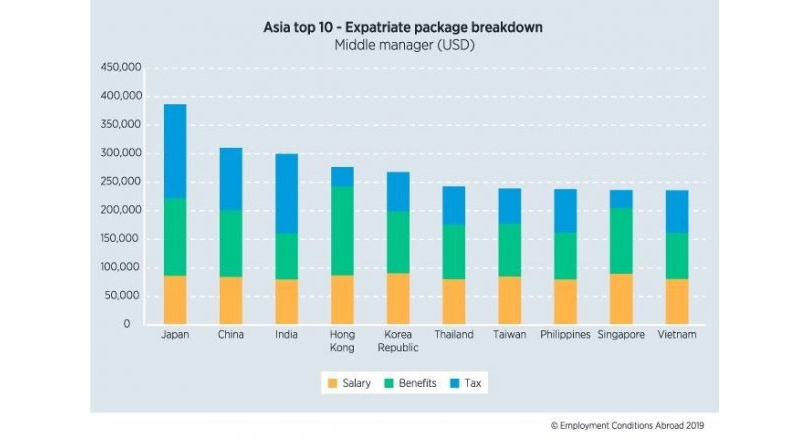Thai expats see incomes soar
The pay and benefits packages of expatriates in Thailand saw a major increase, with the overall package of an average overseas worker increasing by US$27,917 year on year, according to a new survey.
Lee Quane of ECA International said the MyExpatriate Market Pay report reflected Thai economic growth
He said: “The Thai economy has continued to see an upward trend in recent years, with a steady and sustained increase in overseas business – and consequently, expatriate workers – to the nation.”
“In the strengthened demand for expatriate-standard accommodation has, in turn, resulted in higher wages and benefits as increasing numbers of higher-skilled employees move to Thailand.”
Elsewhere in Asia, expatriate pay packages in Singapore rose by US$13,163 in 2018 to US$236,258, including an average cash salary of US$90,170.
When considering the cost of an expatriate package, companies need to factor in three main elements: the cash salary, benefits – such as accommodation, international schools, utilities or cars – and tax.
To assist companies relocating staff with benchmarking their packages against the market, ECA conducts its annual MyExpatriate Market Pay Survey of pay levels for expatriates, including benefits, allowances, salary calculation methods and tax treatment.
“Expatriate pay packages in Singapore increased across the board in 2018, with salaries increasing by nearly US$5,000 and benefits going up by US$6,400 on average,” said Quane. “However, with minimal increases in personal tax and extremely low tax-related costs as compared to most of the other locations in our rankings, Singapore sits at the 19th position globally. This is good news for companies with employees currently living in Singapore, as the relatively high cash salary and benefits and low taxes result in less expense for employers when relocating staff to the country.”
Hong Kong’s expatriate pay packages continued to grow in 2018, with the average package costing companies US$276,417, including an average salary of US$86,984. The overall expatriate pay package in Hong Kong has risen by US$7,902 since last year, with increases to salaries and benefits making up the vast majority of the rise.
Quane said: “After a slight drop in the average expatriate salary in 2017, the overall pay package in Hong Kong increased significantly in 2018. Salaries rose slightly by an average of just over US$1,500 while benefits, including additional expenses on top of the basic salary such as school fees or transportation costs, increased by over US$6,000. The benefits offered as part of an expat’s pay package have always been high in Hong Kong as the small nation continues to be attractive to companies and expatriates alike. Such high costs in expatriate-level accommodation, education in international schools and other expenses result in Hong Kong being significantly more expensive than most other locations.”
Meanwhile, Japan is no longer the most expensive location in the world to send expatriates, after being overtaken in the rankings by the United Kingdom.
“Despite an increase of over US$30,000 to the average expatriate pay package from 2017, Japan has dropped back into second place in our rankings after overtaking the UK in 2017. Although sending a mid-level overseas employee to Japan would now amount to US$386,451, the cost is still US$35,347 behind the total cost of sending an expatriate to the UK.
“Although the overall cost of the pay package for an expatriate in Japan increased by an average of 8.5 per cent in 2018, Japan would most likely have remained at the top of the rankings if not for the significant rise in accommodation costs in the UK last year,” added Quane.
The pay and benefits package of an expatriate living and working in China saw a significant rebound last year, after falling in 2017. The average package is now valued at US$310,204 – an increase of over US$33,000. This pushes China up one place in the rankings to the third position.
Quane said: “Expatriates in China have seen a big jump after a bad year in 2017, which saw the value of the average package drop in all areas. The Chinese yuan experienced a better year in 2018 due to a stronger economy and currency, and has resulted in a considerable improvement in the pay package for overseas workers in China.”
Source: http://www.nationmultimedia.com/detail/Economy/30369903


 Thailand
Thailand




